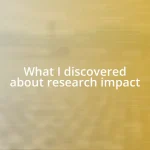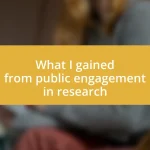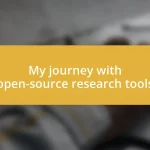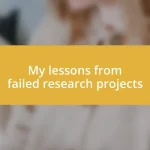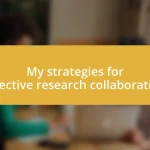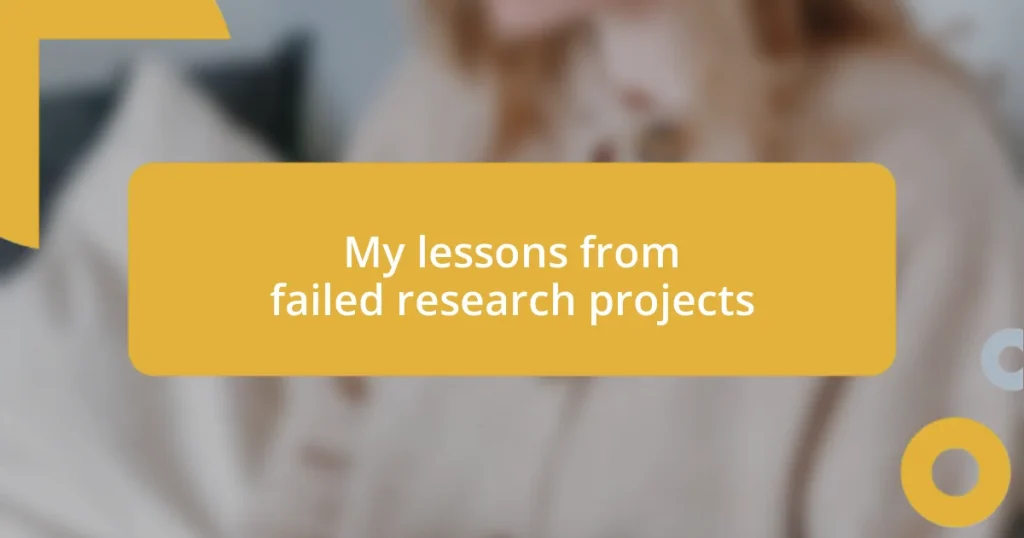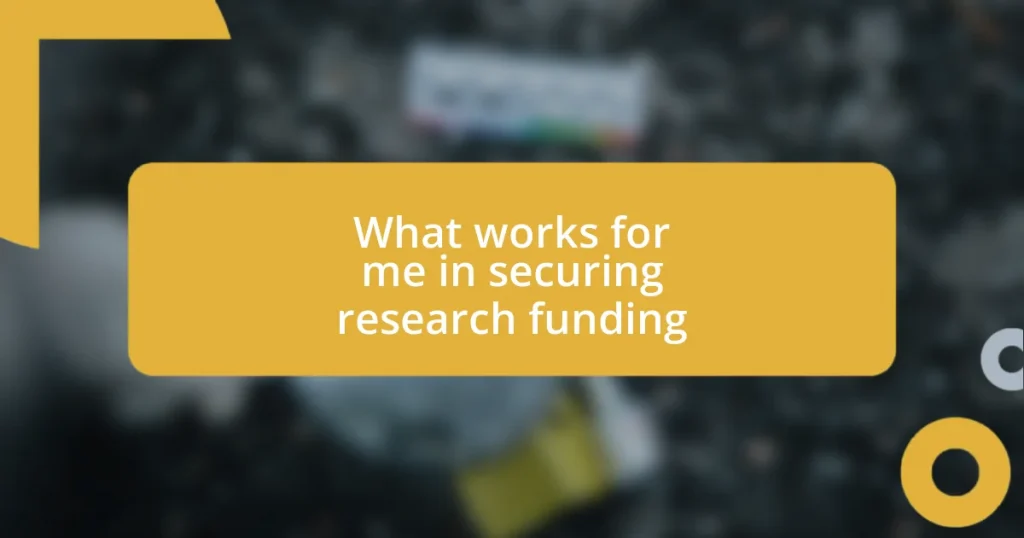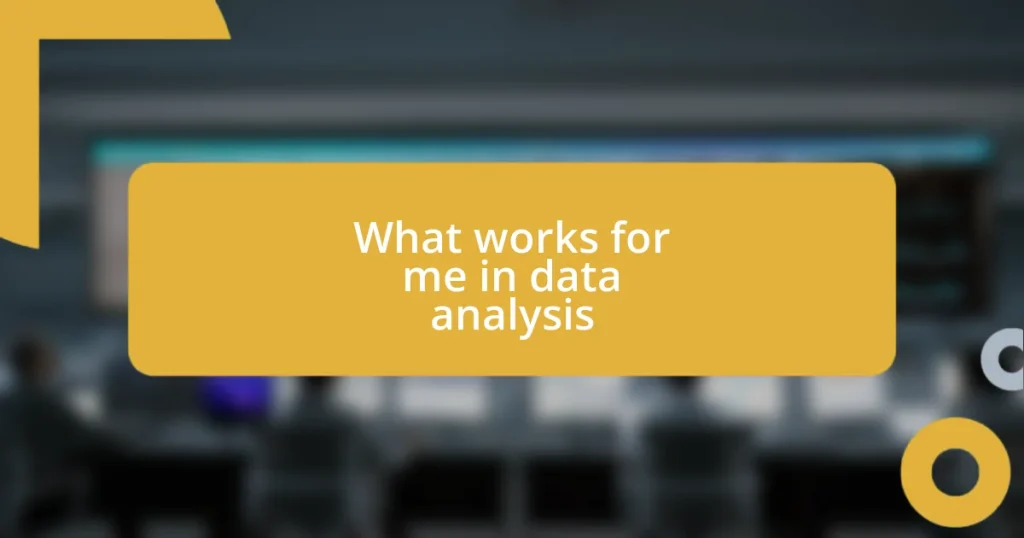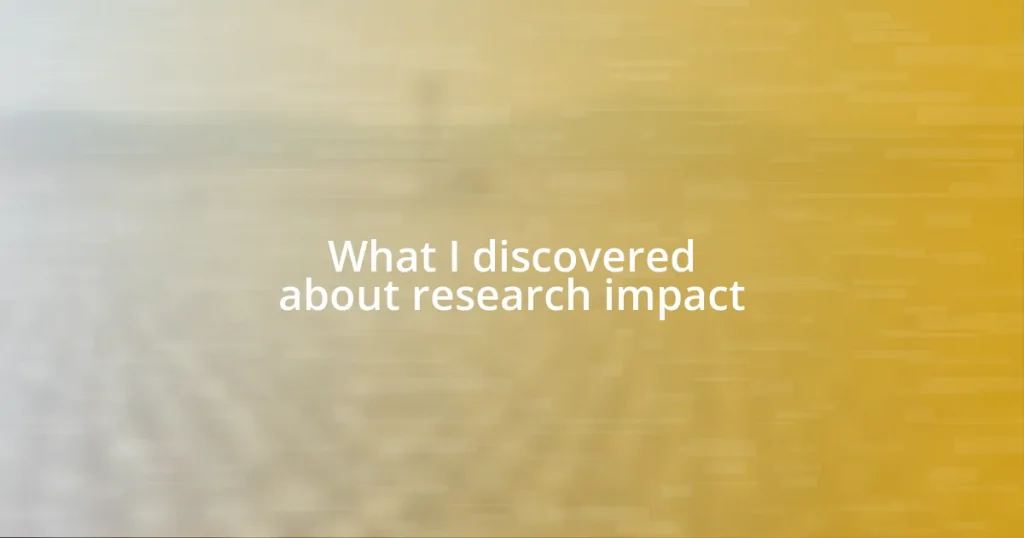Key takeaways:
- Failures in research provide valuable lessons, such as the need for adaptability, resilience, and open communication with stakeholders.
- Common reasons for project failures include poor planning, inadequate data collection methods, and neglecting stakeholder involvement.
- Establishing clear goals, conducting thorough literature reviews, and incorporating regular checkpoints can significantly enhance the effectiveness of future research planning.
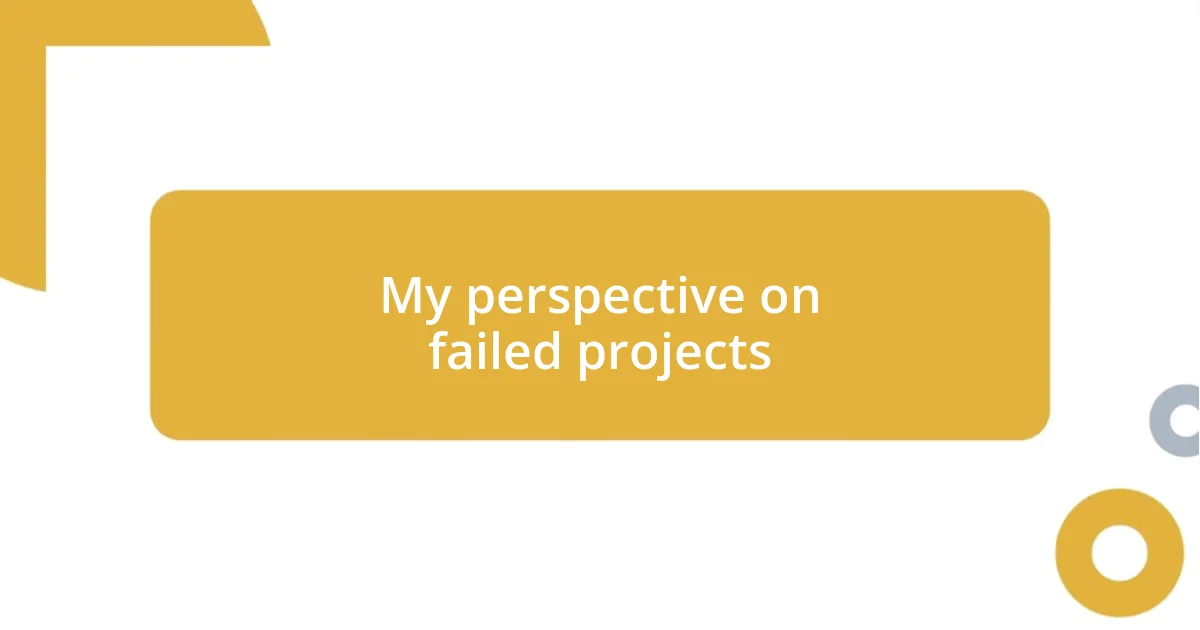
My perspective on failed projects
Failed projects can feel like a punch to the gut; I remember one where I poured countless hours into research, only to find that my hypothesis was completely off-base. It hit hard, but I learned that each setback is an opportunity disguised as disappointment. How can we turn these moments around?
When I reflect on my experiences, I realize that failure offers invaluable lessons, if we’re willing to listen. One time, after a particularly daunting setback, I took a step back and assessed what went wrong. I found that not only was my methodology flawed, but I had also relied too heavily on assumptions without validating them—something I vowed never to do again.
The emotional rollercoaster of failed projects can be disheartening, yet it often ignites a spark for creative solutions. Have you ever noticed how a setback can lead to unexpected breakthroughs? I certainly have, and those moments remind me that the path to success is rarely linear; it’s filled with bumps that serve as signposts guiding us toward better decisions.
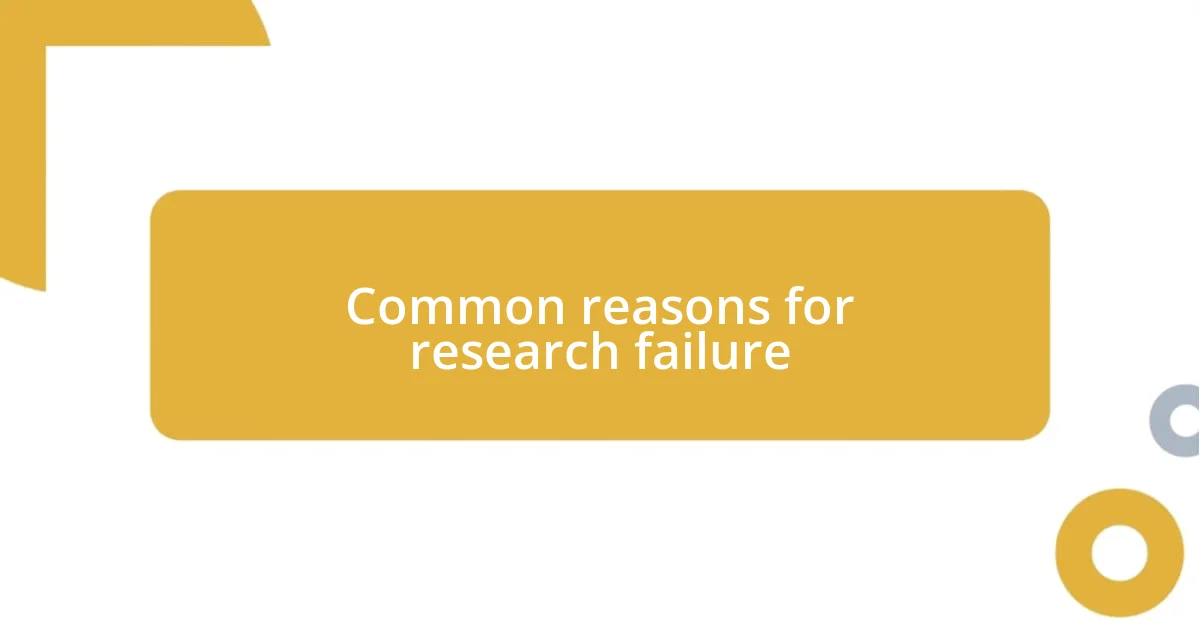
Common reasons for research failure
When I think about the common reasons research projects fail, a few key themes emerge. One significant factor is poor planning, which can lead to misunderstandings about the research objectives. I once embarked on a project without a clear focus—my team and I ended up going down multiple rabbit holes, and by the time we gathered our findings, we realized we had veered way off course. It was frustrating, but it highlighted the importance of having a solid blueprint.
Another reason that often crops up is inadequate data collection methods. I remember a study I was involved in where we had high hopes but failed to properly calibrate our instruments. The resulting data was inconsistent, which inevitably skewed our findings. This experience taught me that accuracy in the initial phases is crucial. Engaging with the right tools and checking our processes might seem tedious, but it pays off in the long run.
Lastly, a common pitfall is neglecting to involve stakeholders early in the process. I learned this the hard way when I assumed everyone was on the same page regarding our project’s goals. Halfway through, we discovered we were addressing entirely different questions! Open lines of communication can be the difference between a project flourishing and it turning into a chaotic mess.
| Reason for Failure | Personal Insight |
|---|---|
| Poor Planning | Lack of focus can derail objectives. |
| Inadequate Data Collection | Accurate methods are integral to reliable outcomes. |
| Neglecting Stakeholders | Communication prevents misalignment on goals. |
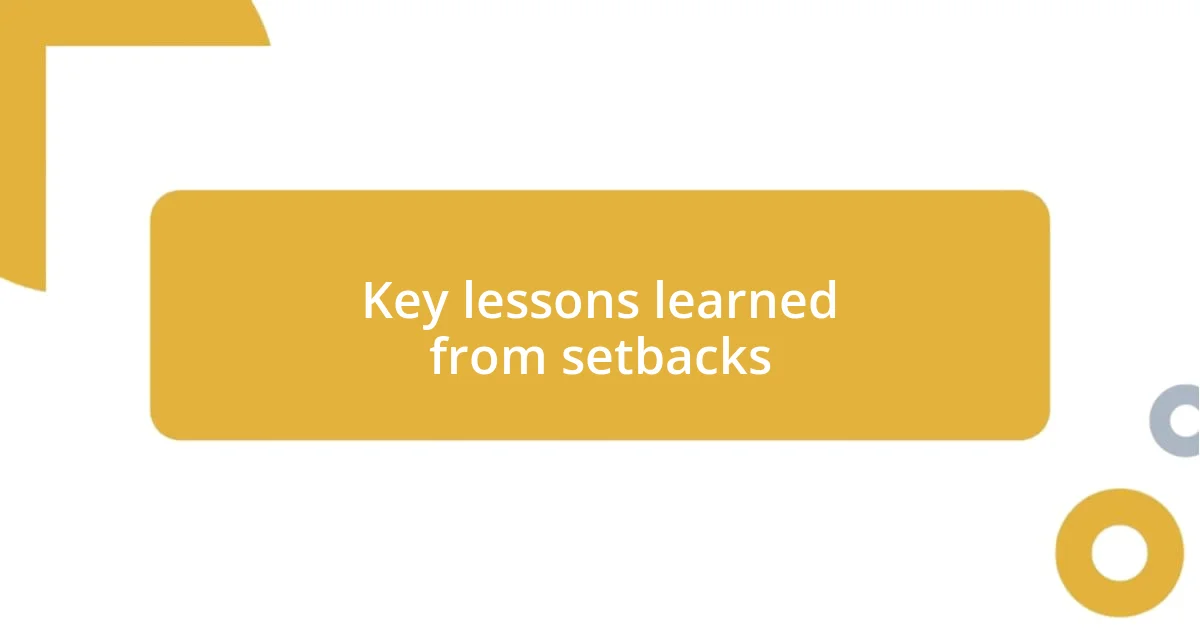
Key lessons learned from setbacks
One key lesson from my research setbacks is the importance of adaptability. I vividly recall an instance where I had to scrap an entire experiment because my initial methodology became outdated due to new findings in the field. It was a humbling experience, but it taught me that flexibility is essential. Embracing change, instead of resisting it, can lead to more innovative approaches.
- Stay Open to New Information: Being willing to pivot based on the latest research can enhance the quality of your work.
- Reflect Often: Regularly assess your progress and be prepared to adjust as needed.
- Seek Feedback: Don’t hesitate to ask for input from colleagues; fresh perspectives can unveil aspects you might have overlooked.
Another profound takeaway revolves around the need for resilience. I remember the heartache of pouring my energy into a study, only to receive disappointing results. Instead of giving up, I re-evaluated my data and tried to uncover the hidden stories within it. That experience taught me that each setback can unveil a wealth of insights, and a little persistence can transform frustration into discovery.
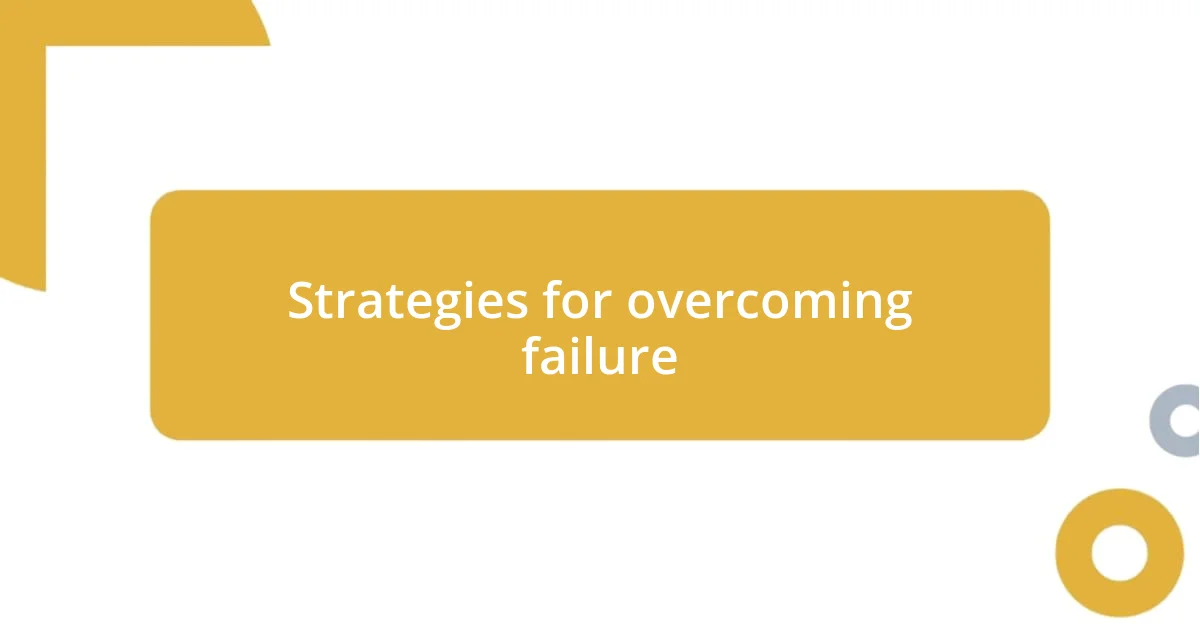
Strategies for overcoming failure
One effective strategy for overcoming failure is to cultivate a habit of reflection. After a challenging project, I often sit down with my journal to sift through what went wrong. This process is not just about listing mistakes but about understanding the emotions tied to those failures. Have you ever noticed how a little self-reflection can turn a frustrating experience into a learning opportunity? By acknowledging feelings of disappointment, I can find clarity and pinpoint exactly where improvements are needed, which makes future endeavors more robust.
Another approach involves seeking mentorship or collaboration. I fondly recall a time when I was struggling with an analysis I couldn’t wrap my head around. I reached out to a senior colleague whose insights were invaluable. Not only did they help me reframe my approach, but their perspective also allowed me to see the potential I was missing. Have you ever hesitated to ask for help only to realize later that a fresh set of eyes could have made a world of difference? Embracing collaboration can breathe new life into stagnating projects, opening pathways to innovative solutions.
Lastly, setting up a structured feedback loop is crucial. In a recent research initiative, our team implemented bi-weekly check-ins to discuss our progress and hurdles together. This ongoing dialogue created a supportive environment where challenges could be addressed promptly. I can’t stress enough how this practice transformed our workflow. It wasn’t just about assessing the project; it was about creating a space where ideas could flow freely and collectively, fostering a culture where failure was seen not as an endpoint, but as a stepping stone toward success. Isn’t it empowering to know that every setback can become a source of collective learning?
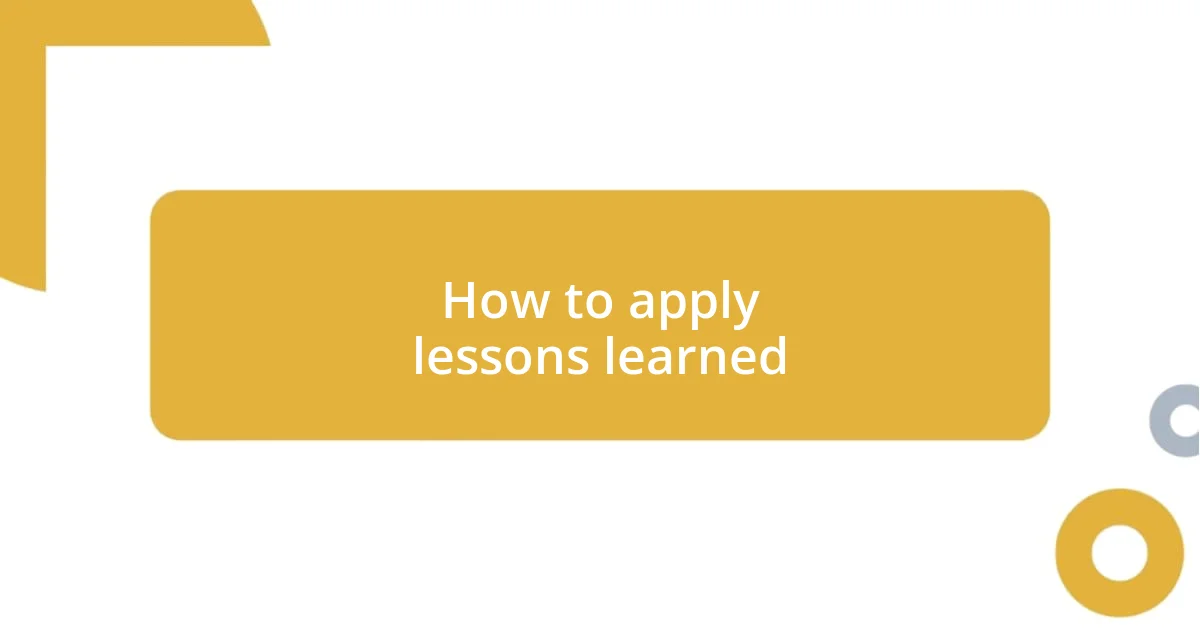
How to apply lessons learned
To truly apply the lessons learned from my past research failures, I’ve found that creating actionable strategies is essential. One of my favorite methods is to establish a ‘lessons learned’ session after completing a project, where I gather my team to openly discuss what went awry and what succeeded. This type of open dialogue not only surfaces insights that might have gone unnoticed but also fosters a sense of camaraderie. Have you ever experienced the relief that comes from sharing missteps with others? It’s a reminder that we’re all in this together, making the journey feel a little less isolating.
Another way I apply these lessons is by integrating failure analysis into my planning stages. I make it a point to ask: “What could go wrong?” during project inception. I vividly remember a project where I anticipated potential roadblocks based on previous experiences. By preparing contingency plans in advance, I didn’t just mitigate risks; I also empowered my team to feel more confident in our approach. The result? We navigated the challenges with greater ease and came out stronger. Isn’t it fascinating how proactively addressing potential issues can change the entire dynamic of a project?
Lastly, visualization of my research journey helps in applying my lessons learned more effectively. I often create mind maps that visually represent past projects, connecting failures to the insights they provided. This process allows me to see patterns in my struggles and successes, making it easier to identify areas for future growth. I remember feeling a surge of motivation when I finally connected the dots between a previous failure and my newfound strategy. It’s an invigorating experience to watch how past missteps can guide future successes. Have you ever tried visualizing your research experiences? It might just unlock a new layer of understanding that you hadn’t considered!
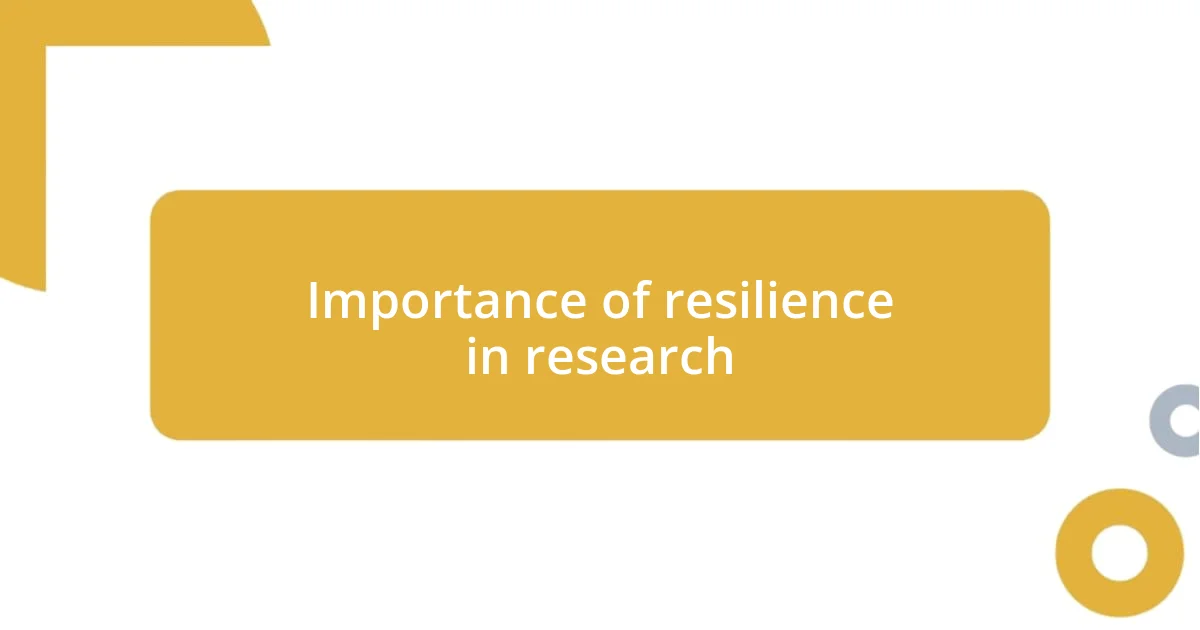
Importance of resilience in research
Resilience in research is essential for pushing through the inevitable obstacles we face. There have been moments in my journey when a seemingly insurmountable challenge left me feeling disheartened. I remember a project that was derailed by unexpected results. At that moment, I had a choice: wallow in frustration or adapt. Embracing resilience helped me pivot my approach, transforming what felt like failure into a valuable lesson. Isn’t it amazing how a single shift in perspective can open up new avenues for growth?
I’ve learned that resilience fosters a mindset that is open to experimentation and risks. During one particularly daunting study, I faced constant setbacks with data collection. Instead of surrendering to discouragement, I decided to reframe my mindset. Each failed attempt became a mini-experiment where I learned something new, which gradually led me to discover a more effective methodology. This experience highlighted the incredible truth that resilience isn’t just about bouncing back but about moving forward with renewed determination. How has resilience played a role in your own research experience?
Additionally, the support of a resilient community has been invaluable to me. I recall a time when I felt utterly defeated over a paper that was rejected after months of hard work. Instead of giving up, my colleagues rallied around me. They shared their own rejection stories, providing the encouragement I needed to push on. Their resilience inspired me to refine my work rather than abandon it. It brought to light a profound understanding: we rise not just through our own strength but by leaning on others. Have you found that the people around you can bolster your resolve in times of need?
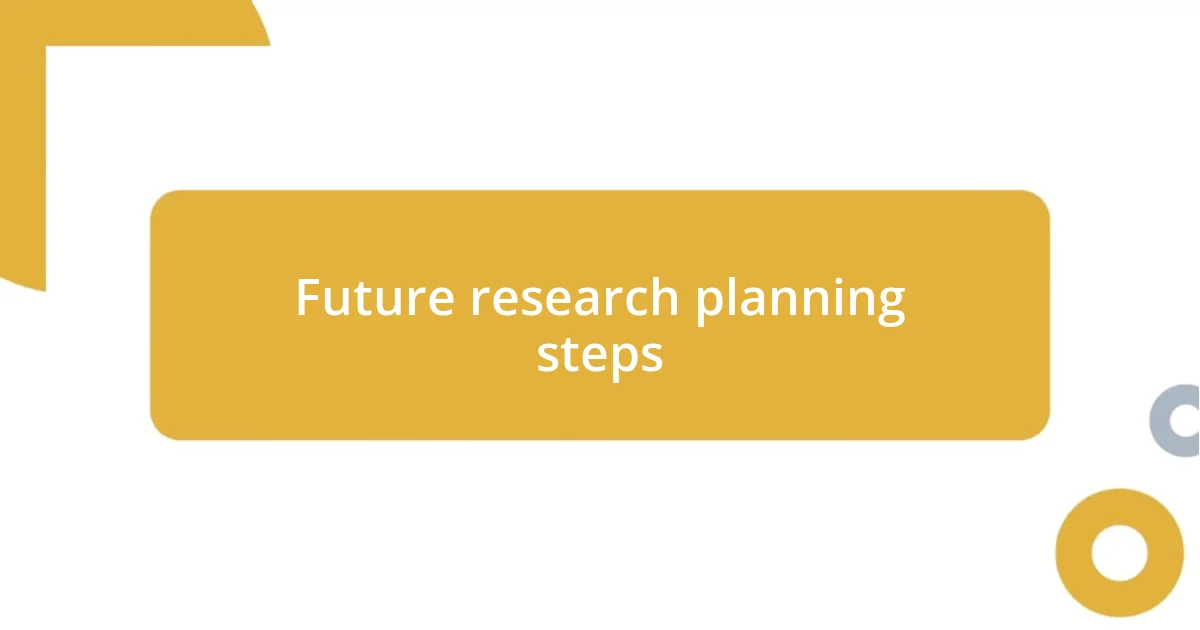
Future research planning steps
To plan future research effectively, I prioritize setting clear, attainable goals right from the outset. I’ve learned that vague objectives can lead to confusion and misalignment among team members. For instance, in one project, my lack of specificity resulted in my team working in different directions. It was a wake-up call that taught me the importance of clarity. Have you ever found yourself questioning the focus of a project mid-way? Establishing a well-defined goal can keep everyone on the same page and fuel progress.
Another step I find invaluable is conducting a thorough literature review before diving into a new project. Reflecting on past experiences, I remember a research endeavor where I overlooked existing studies, which ultimately wasted precious time. By diligently reviewing previous work, not only can we avoid reinventing the wheel, but we can also build upon existing knowledge. Isn’t it rewarding when we can stand on the shoulders of giants instead of starting from scratch?
Finally, I incorporate regular checkpoints into my research timeline. These milestones allow for reflection and recalibration, ensuring the project stays aligned with its goals. During one particularly hectic study, I instituted weekly check-ins with my team, which revealed critical misalignments that would have otherwise derailed us. This small adjustment not only enhanced accountability but also fostered collaboration. How do you currently track progress in your projects? I believe these intentional pauses can provide invaluable insights that strengthen the overall research journey.


